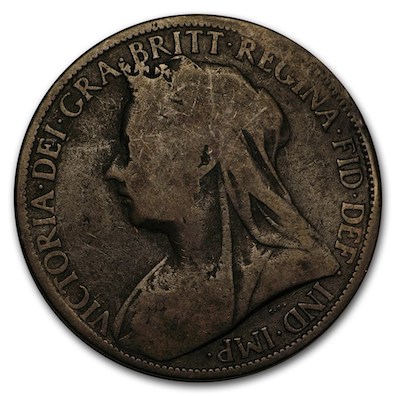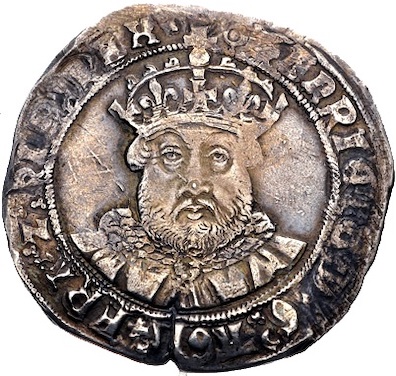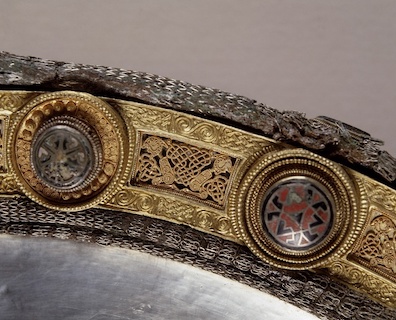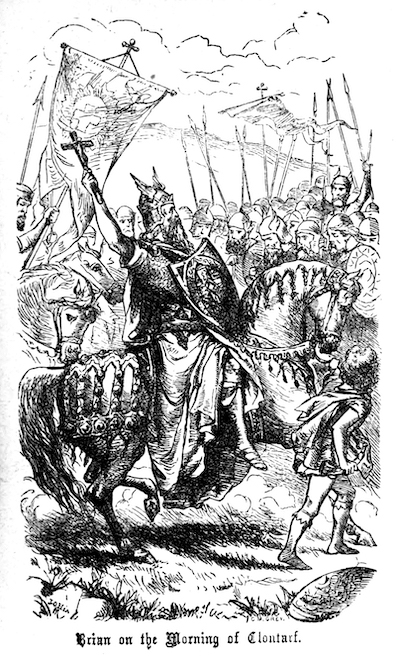In return for his
pint Alf Bergan gives the bartender "
a testoon of costliest
bronze" bearing the "the image of a queen of regal port,
scion of the house of Brunswick, Victoria her name, Her Most
Excellent Majesty, by grace of God of the United Kingdom of
Great Britain and Ireland and of the British dominions beyond
the sea." Testoons were silver coins of 16th century Milan,
France, Portugal, and England. The English ones were worth 12
pence, but they were minted with less and less silver content
during the reign of Henry VIII and were replaced in the reign of
Edward VI by the purer 12-pence shilling. The Numista website
observes that "Some coins, having a high proportion of copper,
started to show copper on the high points as the coin
wore—particularly the nose—leading to Henry VIII acquiring the
nickname 'old copper nose' or 'copper nose Harry'."
Joyce may or may not have been familiar with this chapter of
numismatic history. (He did know of a
similar episode in the time
of James II.) If he did intend a reference to it he would only
have been layering one more ironic contrast onto his
juxtaposition of splendid old silver and tawdry modern bronze.
Bergan buys his stout with a penny, a coin that was minted from
pure copper until 1860 but thereafter from the harder and less
precious bronze. Higher-denomination Victorian and Edwardian
coins were not minted from bronze, a fact which leads Slote,
Mamigonian, and Turner to conclude that "costliest" refers to
pennies being the most valuable such mintings, better than
halfpennies and farthings. But there is a more straightforward
and contextually fitting way to read the phrase. Bergan's coin
is not worth 12 p. and it contains no silver at all, so
"costliest bronze" can also be understood as sarcastic
hyperbole. The transaction taking place in the bar is demeaned
by comparison with something finer, much as testoons themselves
became debased over time.
The long listing of Victoria's imperial dominions and the many
subjugated peoples who know and love her seems to steer the
prose into the sphere of 1904 Dublin, where nationalists like
the men in Barney Kiernan's are ready to jeer at any such
misplaced patriotic fervor. Everything else about these three
paragraphs, however, develops the historical contrast implied by
"testoon of costliest bronze." Terry becomes "
chivalrous
Terence" and hands over a glass of Guinness with the grace
becoming a knight. Alf Bergan, "
the soul of chivalry,"
responds with like magnanimity, handing over a coin not because
a payment of that amount is required but because, like a figure
in medieval romance, he "could ill brook to be outdone in
generous deeds." Terry's acting "
to the manner born," a
Shakespearean allusion, itself balances aristocratic elegance
and barroom crudity. Popular speech has homonymically morphed
the phrase into "to the manor born," suggesting people born with
silver spoons in their mouths, but Hamlet uses it dyspeptically
to refer to Danish drunkenness (
Hamlet 1.4.15).
Joyce's prose also evokes the fine craftsmanship of a
pre-industrial age. The coin's image of a noble queen has not
been stamped by a mechanical press but rather "embossed in
excellent smithwork," and the "crystal cup" (i.e., glass) of
"foamy ebon ale" (i.e., porter) represents surpassing miracles
of human ingenuity. When Joyce writes, "For they garner the
succulent berries of the hop and mass and sift and bruise and
brew them and they mix therewith sour juices and bring the must
to the sacred fire and cease not night or day from their toil,
those cunning brothers, lords of the vat," he is trying out a
mode of medieval parody that he will explore more brilliantly in
the
Mandevillean
section of
Oxen of the Sun.
Still another echo of lost splendor comes in the "O" prefix for
Irish surnames. These tags fell out of favor after English state
power suppressed Gaelic tribal culture in the 16th and 17th
centuries, seizing valuable land, creating a landed gentry of
loyal Protestants, and impoverishing a vast Catholic peasantry.
The "O"s were revived, however, by many 19th century Catholic
families who wanted to celebrate their country's pre-colonial
past. The second historical parody has called attention to them
by making Bloom a warlike "O'Bloom" modeled on
the Rory
O'Moores of the 16th and 17th centuries. This parody
returns to that theme, making little Alf Bergan "
the young
chief of the O'Bergans." (In all print editions of the
novel, including Gabler's, and even in the Rosenbach manuscript,
the clan name is "O'Bergan's." Surely this is an error.)
Gifford speculates that "
Terence O'Ryan" may allude to a
man of that name who was curate-in-charge of a local Roman
Catholic church ("only appropriate, since '
curate' was
slang for bartender"), and the Slote team affirms his reading.
But just as Joyce encourages readers not to take the coin at
face value, he may well be playfully misrepresenting the
bartender's name. Calling him "Terence" is notably
arch—elsewhere in
Cyclops (21 times in all), he is known
simply as Terry. (Just before the parody begins, Alf has
commanded, "Hurry up, Terry boy.") Similarly, the surname O'Ryan
appears nowhere else in
Cyclops, so it too could be the
work of parodic exaggeration. Chivalrous Terence engages
chivalrous Alf in an exchange of knightly generosity, so one may
infer that, rather than taking an obscure dig at a local parish
priest, Joyce is instead ludicrously styling his bartender the
young chief of the O'Ryans—a purely fictive tribe.
Flattering fictions of this sort were the stock in trade of
the Irish Literary Revival. By so pointedly contrasting modern
bronze pennies with the silver coins, tribal bloodlines,
chivalric behavior, and fine craftsmanship of pre-British
times, Joyce makes explicit what was only (though quite
strongly) implied in the preceding historical parodies:
celebration of a glorious Celtic past is a fool's game.
However repulsive it may be to sing the praises of a
benevolent British monarch, regarding the modern-day Irish as
"all
kings' sons" is equally false.



